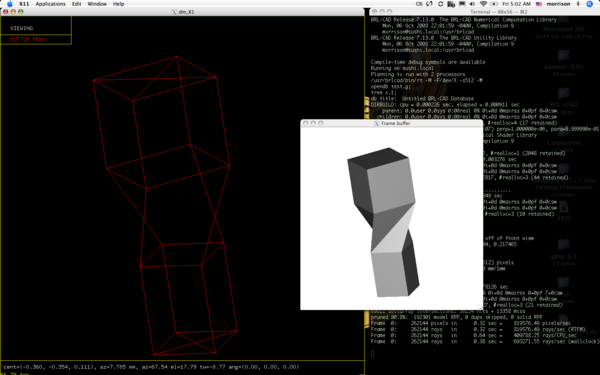Difference between revisions of "BRL-CAD Primitives"
(Added arb8) |
(Added example) |
||
| Line 1: | Line 1: | ||
| − | |||
==arb8== | ==arb8== | ||
| Line 5: | Line 4: | ||
Arguments: 8 Vertices in the following order: 1234 vertices for the front face, starting at bottom left, counterclockwise; then 5678 vertices for the rear face, starting at bottom left, counterclockwise. | Arguments: 8 Vertices in the following order: 1234 vertices for the front face, starting at bottom left, counterclockwise; then 5678 vertices for the rear face, starting at bottom left, counterclockwise. | ||
| + | |||
| + | Example: | ||
| + | |||
| + | in unitcube.s arb8 0 0 0 1 0 0 1 0 1 0 0 1 0 1 0 1 1 0 1 1 1 0 1 1 | ||
| + | |||
| + | creates the unit cube (first vertex at the origin, extends for 1 unit in x, y and z direction). | ||
==ars== | ==ars== | ||
Revision as of 13:44, 3 July 2009
arb8
Arbitrary straight-edged shape with 8 vertices.
Arguments: 8 Vertices in the following order: 1234 vertices for the front face, starting at bottom left, counterclockwise; then 5678 vertices for the rear face, starting at bottom left, counterclockwise.
Example:
in unitcube.s arb8 0 0 0 1 0 0 1 0 1 0 0 1 0 1 0 1 1 0 1 1 1 0 1 1
creates the unit cube (first vertex at the origin, extends for 1 unit in x, y and z direction).
ars
Solids of type 'ars' (Arbitrary Faceted Solids) are defined using "waterlines". The following figure consists of a start point, some number of intermediate polygons, and an ending point. Each of the intermediate polygons have the same number of vertices and the vertices are numbered 1 thru N. In addition to the intermediate polygons a line will be created that begins at the start point, goes through each polygon at its vertex numbered 1, and terminates at the end point. This is repeated for each polygon vertex 2 thru N. The start point, polygons, and end point are each a "waterline".
<need an image here to illustrate the concept>
the ars shape takes the following values as input:
- The number of points per waterline (the number of vertices on each intermediate polygon)
- The number of waterlines (the number of intermediate polygons plus 2)
- X, Y, and Z for a starting point (the first waterline)
- for each interior polygon (an intermediate waterline)
- for each point on the polygon
- X, Y, and Z for the point on the polygon
- for each point on the polygon
- X, Y, and Z for an ending point (the last waterline)
For example, the command:
in x.1 ars 4 6 0 0 3 1 1 3 1 -1 3 -1 -1 3 -1 1 3 1 1 1 1 -1 1 -1 -1 1 -1 1 1 1 0 -1 0 -1 -1 -1 0 -1 0 1 -1 1 0 -3 0 -1 -3 -1 0 -3 0 1 -3 0 0 -3
Will produce a square bar with a tapered 1/8 turn twist in the middle. Of course, more waterlines in the twist and more points per waterline would make the twist smoother.
The parameters to the above ars command can be dissected as:
4 : number of points per waterline (i.e. intermediate polygons have 4 vertices)
6 : number of waterlines (four intermediate polygons plus the two endpoints)
0 0 3 - the center of the top end of the bar
1 1 3 1 -1 3 -1 -1 3 -1 1 3 : a 2x2 square in the xy plane at z offset 3
1 1 1 1 -1 1 -1 -1 1 -1 1 1 : a 2x2 square oriented the same as the first but at z offset 1
1 0 -1 0 -1 -1 -1 0 -1 0 1 -1 : a 2x2 square at a 45 degree rotation from the first squares at z offset -1
1 0 -3 0 -1 -3 -1 0 -3 0 1 -3 : a 2x2 square at a 45 degree rotation from the first squares at z offset -3
0 0 -3 : the center of the bottom end of the bar
